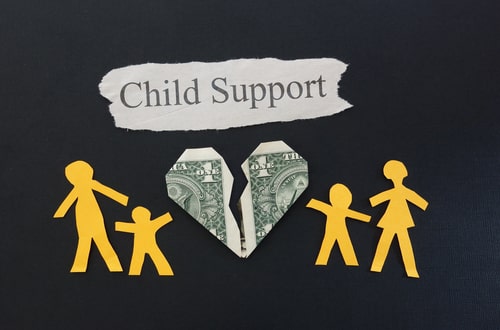Recent Blog Posts
UPDATE: Can I Still Prove Paternity if My Child’s Father Is Deceased?
 Originally published: October 15, 2020 -- Updated: May 11, 2023
Originally published: October 15, 2020 -- Updated: May 11, 2023
Update: As mentioned below, it may be necessary to establish paternity for a child even if a parent has died. By following the proper procedures to recognize that a person is the child's biological father, the child will be able to receive an inheritance from their father, which can provide them with substantial financial benefits both immediately and in the future. However, there are a number of other benefits of establishing paternity, including:
-
Social Security benefits - Children who are under the age of 18 and unmarried can receive Social Security benefits through a deceased parent. If the parent was retired or received disability benefits, the child will generally be able to receive 50 percent of the benefits the parent was being paid before their death. If the parent had worked a sufficient amount of time and paid Social Security taxes, the child will generally be able to receive 75 percent of the basic Social Security benefit the parent would have been entitled to.
How Will My Divorce Affect My Business?
 If you are a business owner who is contemplating divorce, you may be wondering how the end of your marriage will affect your ability to continue owning and operating your business and generating income. This is a valid concern, and you may be worried that your divorce may affect both your personal life and your career, leading to disputes over the ownership of your business, as well as potential financial difficulties. By understanding how the divorce laws in Illinois may affect your business, the methods that may be used to establish the value of business assets, and your options for handling ownership of the business going forward, you can make sure you will be prepared to protect your interests during the divorce process.
If you are a business owner who is contemplating divorce, you may be wondering how the end of your marriage will affect your ability to continue owning and operating your business and generating income. This is a valid concern, and you may be worried that your divorce may affect both your personal life and your career, leading to disputes over the ownership of your business, as well as potential financial difficulties. By understanding how the divorce laws in Illinois may affect your business, the methods that may be used to establish the value of business assets, and your options for handling ownership of the business going forward, you can make sure you will be prepared to protect your interests during the divorce process.
Property Division and Business Assets
During your divorce, your marital property, which may include business assets, will be divided between you and your spouse. If the business is considered a marital asset, it will be subject to property division. As you determine how ownership of your business will be addressed during your divorce, you will need to consider the following:
What Happens if a Parent Does Not Pay Child Support?
 Illinois courts consider child support to be the child's right. Every child deserves to have financial support from his or her parents, even if the parents are unmarried or divorced. When an official child support order is issued, the parent is required to pay the full amount, on time. Chronic failure to pay child support can lead to significant consequences.
Illinois courts consider child support to be the child's right. Every child deserves to have financial support from his or her parents, even if the parents are unmarried or divorced. When an official child support order is issued, the parent is required to pay the full amount, on time. Chronic failure to pay child support can lead to significant consequences.
Penalties for Failure to Pay Child Support
It is important to note that this blog discusses official child support orders, not handshake agreements between the parents. If a parent is not complying with a child support order, he or she can face a range of adverse consequences, including:
-
Debt collection through a collection agency
-
Wage garnishment
-
Asset seizure
-
Liens against personal property
What You Should Know About Mandatory Mediation During a Child Custody Dispute
 Parents often disagree about how child custody matters should be handled. For example, one parent may wish to have virtually all of the parental responsibilities and parenting time, while the other parent believes that custody should be split 50/50. Parents may also disagree about where their child should go to school, the types of extracurricular activities or religious practices the child should be involved in, or countless other issues.
Parents often disagree about how child custody matters should be handled. For example, one parent may wish to have virtually all of the parental responsibilities and parenting time, while the other parent believes that custody should be split 50/50. Parents may also disagree about where their child should go to school, the types of extracurricular activities or religious practices the child should be involved in, or countless other issues.
When divorcing parents disagree regarding child-related legal issues, the court may require the parents to attend mediation. If you are a parent who is planning to divorce, make sure you understand Illinois laws regarding mandatory mediation.
When Does the Court Require Mediation?
Typically, mediation is ordered by the court if the parents disagree about the provisions of the parenting plan. Mediation allows the parents to discuss the issue and work toward a solution without the court’s involvement. Illinois courts typically want to avoid child custody cases becoming highly litigious because this is not typically in a child's best interest. So, the first step is going to mediation.
Can Someone Other than a Parent Get Visitation With a Child?
 When we talk about child custody and visitation, we usually do so in the context of parents spending time with their children. However, Illinois law allows certain non-parents to receive court-ordered visitation in certain situations.
When we talk about child custody and visitation, we usually do so in the context of parents spending time with their children. However, Illinois law allows certain non-parents to receive court-ordered visitation in certain situations.
According to Illinois law, grandparents, great-grandparents, stepparents, and siblings may be granted visitation rights.
When is a Family Member Able to Receive Visitation?
When somebody has court-ordered visitation, they are guaranteed the right to spend time with the child. This can be useful for situations involving family conflicts or when a child's parent refuses to let them see a family member.
Illinois courts presume that a child should spend time with both of his or her biological parents. However, the court may grant visitation to a non-parent if doing so is in the child's best interests. A non-parent may request visitation with the child if the non-parent can demonstrate that he or she was unfairly denied visitation with the child and at least one of the following statements is true:
Co-Parenting Tips for Surviving Summer Break
 Although it is hard to believe, summer break is just around the corner. For children, the end of the school year is often an event that kids look forward to all year. For divorced and unmarried co-parents, however, the end of the school year can bring significant challenges.
Although it is hard to believe, summer break is just around the corner. For children, the end of the school year is often an event that kids look forward to all year. For divorced and unmarried co-parents, however, the end of the school year can bring significant challenges.
Managing a co-parenting schedule in which both parents have parenting time is difficult under the best circumstances. It can be even harder to maintain the schedule and communicate with the other parent about child-related concerns during summer break. If you are a divorced parent sharing custody, consider the following co-parenting tips this spring and summer.
Communicate Early and Often With the Other Parent
Talking to your ex may not be your favorite thing in the world, but it is important to keep the lines of communication open. If your ex has a history of forgetting important child-related information or your relationship with him or her is contentious, it may be best to communicate through written words. Consider using e-mail or text messages to discuss child-related schedules or other information. This ensures that there is a record of what was said and when.
Planning to Move? Make Sure You Understand Illinois Parental Relocation Laws
 If you or your child's other parent intends to move to a new home, it is important that you understand the legal requirements for doing so. When someone is co-parenting with an ex, moving is not as simple as packing up the belongings and driving to the new residence. Depending on the distance between the current residence and the new residence, there may be specific steps you need to take to be able to move with your child.
If you or your child's other parent intends to move to a new home, it is important that you understand the legal requirements for doing so. When someone is co-parenting with an ex, moving is not as simple as packing up the belongings and driving to the new residence. Depending on the distance between the current residence and the new residence, there may be specific steps you need to take to be able to move with your child.
Determine if Your Move Counts as a Relocation
To understand the rights and responsibilities regarding parental relocations, you must first determine if the intended move meets the criteria for relocation under Illinois law. The location of the child's primary residence and the distance between the current residence and new residence determines whether or not a move counts as a relocation.
If you live in one of the following "collar" counties, a move of 25 miles or greater is considered a relocation. If your intended relocation is less than 25 miles, no further action is needed.
Does the Amount of Parenting Time You Have Determine Child Support?
 Parenting time, sometimes called visitation in casual conversation, is the time that a parent supervises a child and meets his or her everyday needs. In Illinois, the amount of parenting time a parent has is described in the parenting plan. Divorced and never-married parents may be able to negotiate the terms of their parenting plan or, if they cannot agree, the court will issue a parenting plan.
Parenting time, sometimes called visitation in casual conversation, is the time that a parent supervises a child and meets his or her everyday needs. In Illinois, the amount of parenting time a parent has is described in the parenting plan. Divorced and never-married parents may be able to negotiate the terms of their parenting plan or, if they cannot agree, the court will issue a parenting plan.
Many people have questions about how parenting time affects child support. Do you pay less in child support if you have the children more often? Can a parent reduce his or her child support obligation by taking on a greater amount of parenting time?
Child Support Laws in Illinois
In 2023, Illinois uses a child support calculation methodology called “Income Shares.” Each parent’s net income and the number of children shared between the parents determine the overall amount of financial support paid by the parents. The parent with the majority of the parenting time receives child support payments from the parent with a lesser amount of parenting time. Since he or she has the child most of the time, the parent with the majority of the parenting time provides his or her financial support by paying for child-related expenses directly.
Child Custody Myths Every Illinois Parent Should Be Aware of
 Whether you are unmarried or planning to divorce, child custody matters may be at the top of your mind. In Illinois, child custody is broken down into two main components. The allocation of parental responsibilities is the allocation of decision-making authority over the child. Parental responsibilities address questions such as where the child will go to school or what type of medical care the child will receive. Parenting time is the second component in a child custody case. Parenting time is the time a parent watches the child and is directly responsible for the child’s safety and well-being.
Whether you are unmarried or planning to divorce, child custody matters may be at the top of your mind. In Illinois, child custody is broken down into two main components. The allocation of parental responsibilities is the allocation of decision-making authority over the child. Parental responsibilities address questions such as where the child will go to school or what type of medical care the child will receive. Parenting time is the second component in a child custody case. Parenting time is the time a parent watches the child and is directly responsible for the child’s safety and well-being.
Child custody issues in a divorce or family law can be confusing, and there are many myths surrounding these complex issues. Read on to learn more.
Myth: Mothers Always Get the Majority of the Parenting Time and Parental Responsibilities
When is Supervised Visitation Required by an Illinois Court?
 Courts generally presume that both parents are capable of providing adequate supervision and care for a child. Unless there is a reason to believe otherwise, parents are generally given the right to have unrestricted parenting time (previously called visitation) with their child.
Courts generally presume that both parents are capable of providing adequate supervision and care for a child. Unless there is a reason to believe otherwise, parents are generally given the right to have unrestricted parenting time (previously called visitation) with their child.
However, the child's best interests are always the top priority in a child custody or divorce case. If there are concerns about a child's safety or a parent's ability to provide a safe environment for the child, the court may order supervised visitation.
Supervised Visitation and Other Parenting Time Restrictions
In some family law cases, a parent or other party raises concerns about the other parent's ability to keep a child safe. In a situation like this, they can petition the court for a parenting time restriction. There are many different types of parenting time restrictions, including limitations on the amount or frequency of parenting time, limitations on who may be present during parenting time, or requirements regarding the transportation of children between the two parents' homes. The court may also require parenting time to be supervised.








